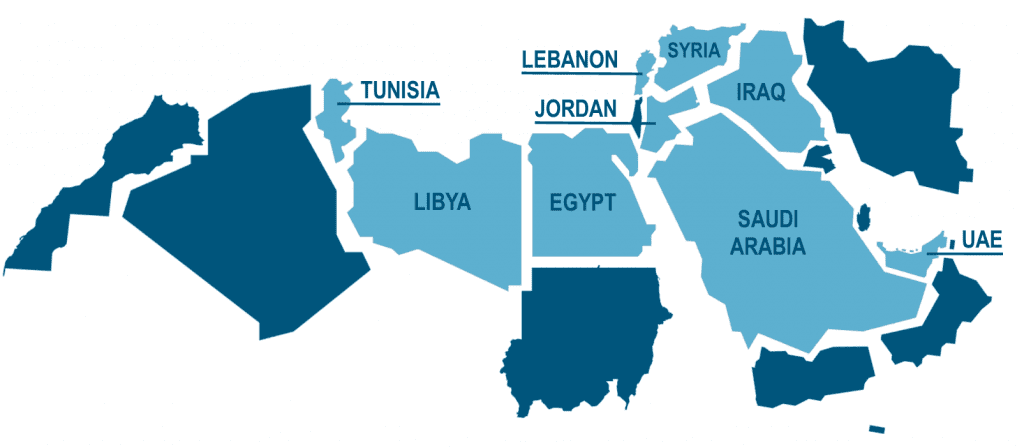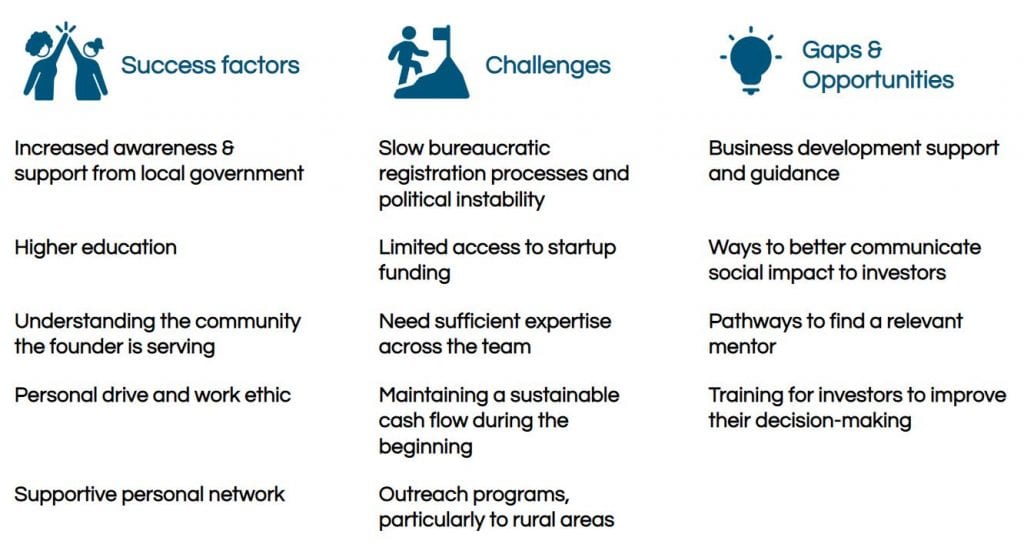This report is available for full download to pdf.
Executive Summary
In recent decades, changes in the political, social, and economic atmosphere in the Middle East and North African (MENA) region have spurred an entrepreneurial spirit in the region, particularly technology ventures. Among entrepreneurial ventures, social innovations are on the rise due for reasons including the ongoing refugee crisis, innovation in education, and the targets set by Sustainable Development Goal 5: Gender Equality; among others. Social Innovations are new initiatives, programs, or technology that aims to improve the lives of people, particularly those who are disadvantaged, and promote the well-being of society. Further, in the MENA region, women are planning an increasingly important role in the creation and implementation of social innovations.
Engineering for Change reviewed 39 technological social innovations in the MENA region designed for or by women. Innovations included technology education platforms, fintech, blockchain, ecommerce, and more. Of these startups five innovators were interviewed with the purpose to gain insights into the success factors, challenges, gaps and opportunities for social innovations in the MENA region.
- Success factors: Increased community awareness, support from local government, individual higher education, understanding the community, personal drive and work ethic, and supportive personal network.
- Challenges: Slow bureaucratic registration processes, political instability, limited access to startup funding, requiring sufficient expertise across the team, maintaining a sustainable cash flow, and outreach to rural communities.
- Gaps & opportunities: Business development support and guidance, ways to better communicate social impact to investors, pathways to find a relevant mentor, and training for investors to improve their decision-making.
Future work includes broadening understanding of social innovations in the MENA region, since startups evaluated were from only nine countries and individuals interviewed originated from two countries. A broader landscape analysis of the social entrepreneurial ecosystem in the region would bring out additional insights. Further, all the initiatives have been successful, thus we are surely missing valuable perspectives from individuals and ventures that were unable to overcome all their challenges.
This work provides a high-level overview of technological social innovations in the MENA region. Public and private entities should establish enabling ecosystems to encourage bright, driven entrepreneurs to create broad social impact for members of society, particularly women, children, and refugees.
Introduction
Communities in the Middle East and North Africa (MENA) region face deep-rooted socio-economic challenges. On the economic level, poverty affects over 36% of the population, with more than 30 million facing hunger [1]. On the social level, youth face high unemployment rates that reached 23.4% in 2010 [2]. Among others, these social injustices came to a tipping point in 2011, resulting in the uprisings of Arab Spring. This revolution led to a surge in entrepreneurship in the region, particularly social ventures targeting cultural activities, health, agriculture, water, sanitation and women empowerment [3].
With these social and political changes, the number of startups in MENA has exceeded 10,000 [4] with 74% of them established since 2012 [3]. United Arab Emirates (UAE) has the highest number of startup headquarters (35%), followed by Egypt (19%), and Kingdom of Saudi Arabia (10%) [4]. Despite these advancements, MENA carries the highest levels of gender inequality in the world, with an estimation of 153 years to “close this gender gap” [5]. According to a study by MAGNITT1 in 2019, female-only founded startups accounted for only 8% of all investments since 2008, with mixed gender and male-only founded startups accounting for 10% and 82%; respectively [4]. Despite the gender difference in startup ecosystem involvement, there appears to be a more balanced ratio between male and female entrepreneurs in the social innovation sector, specifically [3]. While this research will not assess the reasons for gender imbalance, it will investigate the success factors, barriers, and gaps in technology-based social innovation for and by women in MENA.
This research was conducted by Engineering for Change (E4C). E4C is a knowledge organization, digital platform, and global community of over 1 million organizations and individuals dedicated to promoting essential technologies for underserved communities worldwide. E4C’s mission is to prepare, educate and activate the international engineering workforce to improve the quality of life of underserved communities around the world. The Humanitarian Engineering Initiative at the American University of Beirut (AUB) provided guidance on the desk review and methods but was not involved in data collection, interviews, or analysis.
Social Innovation in MENA: An Overview
Social innovation refers to innovative activities and services that are motivated by the goal of meeting a social need, such as education, health, or gender equality. Within social innovation there are technological solutions, consisting of manufactured objects like tools and containers that enhance human capabilities or enable humans to perform tasks they could not perform otherwise [6]. To evaluate successes, challenges, and gaps in technology-based social innovations, a systematic desk review and interviews were conducted. For both the desk and initial background literature reviews, a Google search was initiated using a combination of search terms including: ‘social innovation’, ‘women’, ‘Middle East’, ‘technological innovation’, ‘startups’, ‘gender-based technological initiatives’, ‘challenges’, ‘success factors’, and ‘gaps’. Targeted sources included but were not limited to company reports or briefings, news articles, and peer reviewed journal articles. The relevancy of each website was determined based on whether it addressed the topic of women’s involvement in social innovation in MENA. Based on these findings, a list of social innovation initiatives designed for or by women was compiled and analyzed for content regarding the type of initiative and indicators of success or failure.

Figure 1. Countries included in this evaluation of 39 social innovations designed for or by women in the MENA region.
Next, five semi-structured expert interviews with representatives from relevant social innovation firms were conducted. The goal of the interviews was to determine how the startups were founded and funded, challenges and success factors when establishing a startup with different types of founders (females only, mixed group of males and females) and when trying to engage women from the community, political/cultural landscapes that make the founders’ work successful or harder and gaps in practice. Our research team reached out to many of the initiatives identified in the desk review and snowball sampling was used after the first initial respondents replied. Interviews were conducted via video chat with representatives from five different social innovation startups. The five interviews were conducted with founders or representatives of selected social innovation initiatives. Four of these initiatives were based in Lebanon and the fifth was based in UAE. The following is an overview of each de-identified startup:
- Electronic device upcycling for refugees and disadvantaged children (laptops, tablets and projectors); founded by a woman.
- Technology and logistics company that provides access for delivery services in emerging neighborhoods; founded by two men, then one woman joined at an early stage.
- Innovation and education programs for children refugees; founded by one woman founder.
- Technology educational hub for extracurricular programs for youth; founded by a woman founder.
- Online educational platform and in-person workshops to teach young students engineering, design, and coding; founded by two men and one woman.
Trends in Women-driven Social Innovation in MENA
Research of 39 identified startups showed that women and mixed gender founders focused mainly on e-commerce (26%) and education (23%), followed by healthcare (7.7%). The breakdown of software, hardware, and combined software and hardware companies was 69%, 18% and 13%; respectively. Of these, 53% had a female founder, 45% had at least one male and one female founder, and one had a male founder. Eight (21%) companies targeted women specifically, and three (8%) focused on refugees. By country, 14 were incorporated in UAE (36%), nine in Egypt (23%), seven in Jordan (18%), two in Lebanon (5%), Saudi Arabia (5%), and Tunisia (5%), and one in Iraq, Libya, and Syria (a map of these countries is shown in Figure 1). A detailed overview of solutions that additionally includes information on the country of incorporation, intended impact, and intended beneficiaries is presented here.
During the interviews with representatives from five startups, interviewees were asked open-ended questions about their experiences with their startup. Findings from these interviews were categorized into three groups: Success factors, Challenges, and Gaps & opportunities.
Success factors for startups
The invention, design and manufacturing of these artifacts require a larger system including hardware (such as machinery or a manufacturing plant), factor inputs (labor, energy, raw materials, capital), and finally “software” (know-how, human knowledge and skills). The most represented sectors in social innovation initiatives are education, handicrafts, sustainable development and poverty reduction, and the environment [3]. These are followed by agriculture and food, health, and refugee assistance.
Furthermore, all interviewees highlighted the importance of emotional and financial support, access to resources including skilled workers, mentors, and entrepreneurial workshops. Further, several interviewees specifically mentioned the importance of understanding the context in which the solution was being delivered. Familiarity with the culture and other contextual factors enabled these founders to create a business model that targeted and helped to address a real user pain point. Knowledge of who a technology is being designed for may be a differentiator between successful and unsuccessful social innovations. The importance of context-based, local knowledge highlights the potential role of ethnographic and user centered design methods that bring a stronger understanding of the end user. Similarly, coming from a similar background as their initiative’s intended beneficiaries was invaluable. For example, one founder was a Syrian living in Lebanon, which enabled her to better design technology for Syrian refugees in Lebanon. In another example, a mother of two capitalized on her personal experience while beginning a venture to design educational tools for children.
Challenges for startups
Throughout the wide range of sectors covered, these innovations face universal challenges when operating in MENA, including conflict and political instability, funding challenges, and acute environmental threats (water scarcity, food insecurity, desertification, drought and energy inefficiency) [3]. These challenges are found to be amplified for women entrepreneurs because of the regulatory environment, laws and public order, discriminatory environment, and difficulties in accessing finance [7]. Women also disproportionately face the responsibility of taking care of their families and may be more likely to experience the perception of a lack of self confidence, experience, information, contacts, assistance, family support, management or entrepreneurial skills [7].
Key challenges highlighted included a lack of funding sources and difficult regulatory environment. However, contrary to the hypothesis of the initial problem statement, no respondent reported feeling at any disadvantage for being a woman founder. An additional finding was that several organizations had trouble sourcing or locating tech talent, and also experienced difficulty in developing a sustainable business model and viable marketing strategy. There is also an oversaturation of startups, many of which were thought to not have a viable business case that addressed a real user pain point. The oversaturation also led to a slow approval process for new startups due to backlog, and caused increased competition over finite funding sources. One interviewee stated that they felt that startups with the largest “hype” were often funded over initiatives of higher quality in terms of their business model.
Gaps & opportunities for startups
Despite these challenges, there are successful initiatives that overcome these setbacks. For MENA, young demographics (the majority of people are aged between 20-40 years) and little technology legacy (less advancement in technology and entrepreneurship) make room for new innovative technological developments [8]. Moreover, the number of active investors increased by a compound annual rate of 31% between 2012 and 2017 (from 51 in 2012 to 195 in 2017) [9]. The majority of these investors are based in four Arab countries: 32% in UAE, 17% in Saudi Arabia, 13% in Lebanon and 10% in Egypt [9]. The investor community is almost equally spread between early-stage funders such as angel investors, seed funders and incubator programs, and later-stage venture capital, growth capital and corporate investors [9]. Women entrepreneurs also have increasing opportunity to take advantage of provided resources – initiatives, websites and incubators – to optimize their entrepreneurial skills [7]. These resources also enable them to gain language and intercultural skills, and seek out challenging and higher-profile undertakings [7]. These factors have been found to help women succeed with their innovations.
Although the topic of social innovation has gained traction, and governments are acting to encourage people to innovate, there are still gaps in practice and research. In practice, there is not a full understanding of what policies currently exist and what policies are needed to encourage women to participate in technological innovation. On the research side, there is an over-emphasis on macro level indicators (culture, religion, etc.) and a lack of studies within different ethnic groups or studies that acknowledge the complex social, cultural and religious diversity in the region [10]. There is also a need for more attention focused towards emerging trends in MENA, including political and economic uncertainties. In terms of research design, there is a need for theoretical frameworks to substantiate future studies.
Interviewees identified gaps in the ecosystem, such as mechanisms to train and locate tech talent, mechanisms to identify suitable and affordable mentors and consultants, and entrepreneurial workshops or programs that provided training and evaluation of identifying a real problem with a scalable solution accompanied by a long-term business model. As incubators, hubs, and workshops all currently exist, this gap points to an issue of quality over quantity. Entrepreneurial support should include the creation of a network of mentors, and adapt their current trainings to incorporate a longer-term business vision. There is also training needed on the investor side to enable them to make more informed investment decisions. Existing resources that address these considerations could be integrated into current educational services. In terms of locating tech talent, further research should be conducted on whether it is an issue of the overall numbers, whether the education systems contribute to this issue, future trends in STEM education to project future tech talent base, if other regions are attracting this tech talent away from MENA, among other possible factors.
Limitations and future work
With this preliminary research, we have identified some of the major challenges, success factors, and gaps for technological startups and social innovations in the region. However, work to further this research should be done in the following areas:
- Since 4 out of the 5 startups interviewed are in Lebanon, future work would benefit from a more representative sample of the startup ecosystem in the MENA region.
- Further research should also be conducted on differences for technological innovation in urban versus rural regions. Preliminary findings indicated that enacting technological solutions, especially ones that targeted gender equity, was much more challenging in rural areas due to prevailing views around women in education.
- Include both successful and failed ventures to highlight additional challenges faced by founders with failed initiatives.
A Growing Ecosystem: Women-led Social Innovations in MENA
Social innovation startups and initiatives founded for and by women in MENA must be well-acquainted with the context they are serving. They also require long-term support on how to raise and allocate funds and create a sustainable business model and marketing strategy. Perhaps surprisingly, the interview respondents did not report feeling any bias towards or barrier of being a female founder; however, the sample does not include women-founded startups that have failed to come to fruition. Prevailing challenges for startups include lack of team expertise and business sustainability. Funders and regulators should continue to embrace and encourage the driven social entrepreneurs through enabling funding and regulatory environments. There are more than 10,000 currently operating startups in MENA, and women are increasingly playing a substantial role. As the ecosystem continues to grow, women’s role in pioneering innovation must continue to be fostered.
To view the summary of 39 social innovations in MENA click here.
Edited by: Grace Burleson
Additional contribution: Hala Ghattas, Mariela Machado
References
[1] Social Innovation Atlas, 2019, “Atlas of Social Innovation. 2nd Volume- A World of New Practices,” J. Howaldt, C. Kaletka, A. Schröder, and M. Zirngiebl, eds., oekom Verlag GmbH, Munich.
[2] International Labour Organization, 2011, “Youth Unemployment in the Arab World is a Major Cause for Rebellion.”
[3] Schreiner, K. and Junge, J., 2018, “ An Overview of Social Innovation in the Middle East and North Africa,” SIX.
[4] Magnitt, 2019, “The Start-up Ecosystem in the Arab World.”
[5] World Economic Forum, 2018, “The Global Gender Gap Report.”
[6] Grübler, A., 1998, “Technology: Concepts and Definitions,” Technology and Global Change. Cambridge University Press, Cambridge, pp. 19-90.
[7] Laffineur, C., Tavakoli, M., Alain, F., Amara, N. and Carco, M., 2018, “Insights from Female Entrepreneurs in MENA Countries: Barriers and Success Factors,” Entrepreneurship Ecosystem in the Middle East and North Africa (MENA). N. Faghih, M.R. Zali, eds., Springer International Publishing.
[8] Allan, K., 2017, “The Middle Eas Presents a Vast Digital Transformation Opportunity,” IDG Connect.
[9] Saleh, Y., 2018, “Special Report: Entrepreneurship in the Arab World: the Opportunities, Challenges, the Stakeholders and the Funding Environment,” ZAWYA.
[10] Bastian, B.L., Sidani, Y.M., El Amine, Y., “Women Entrepreneurship in the Middle East and North Africa,” Gender in Management, 33(1), pp. 14-29.


No Comments.